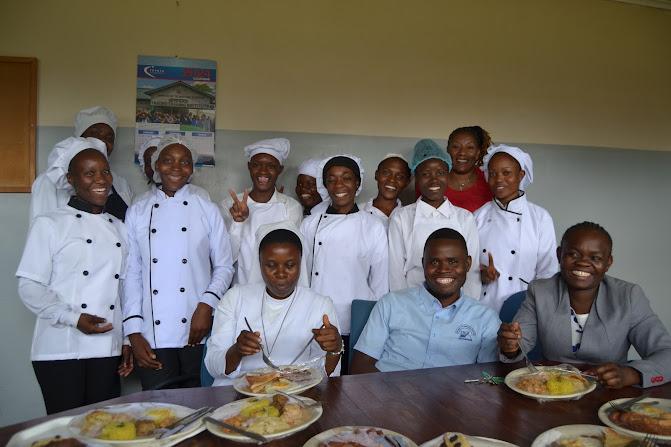By Derrick Silimina
From humble beginnings to cherished milestones, Christabel Songiso's academic journey at Holy Cross Girls Secondary School has been extraordinary.
In 2012, before her midterm grade nine examinations, Songiso's schooling almost came to a halt after she learned that her biological mother was terminally sick, a crisis that made her fail to concentrate on her studies or prepare for final exams at the Catholic-run facility which is nestled near the Barotse Floodplain on the Zambezi River in the heart of Mongu town, about 580 kilometers west of Lusaka, Zambia's capital.
"A day before my midterm exams, Mum became very sick, and she got admitted to the hospital. I had no choice but to take care of my 1-year-old baby brother, and that really disturbed me a lot," Songiso told Global Sisters Report.
Songiso said she broke down considering other financial burdens her parents were grappling with, and she gave up on the crucial examination preparations.
The Sisters of the Holy Cross discovered Songiso's potential when she lost hope in life. Songiso acknowledged that what brings school-going children down, especially girls, is not having support from their families to pursue their education.
Songiso paid a glowing tribute to the sisters from her family boutique business, Maycorn Fashion and Business Solutions, for enabling her to complete her high school education at the Catholic-run girls' school despite losing the desire to step foot in a classroom.
"In 2012, the religious sisters placed me under the care of a Catholic family where they sponsored my schooling until I completed high school in 2015 at the Holy Cross School. So they [sisters] knew my story and saw the need to help me. They paired me with the Catholic family that took me up, and I'm still with them. I am very grateful! They're very good people.
Yeah, so you can imagine without the Holy Cross Sisters, I couldn't have been where I am today," she said.
Songiso learned more about the sisters and how they effectively assisted students who had challenges paying school fees. The sisters also monitored girls' educational challenges and moral behavior. Sonsigo felt inspired by the Holy Cross Sisters' zeal for girls' education in Mongu.
Sonsigo, 26, narrated with nostalgia how her foster family sponsored her from grade nine until the completion of the 12th grade and her degree in literature at the University of Zambia.
Against all odds, she graduated in 2022 and is pursuing her master's while helping manage Maycorn Fashion and Business Solutions with ease.
"I am waiting for the government to deploy me in the civil service since I applied this year and hope to be considered in the government teacher's recruitment drive."
Clara Chama is one of many other girls who sought help at Holy Cross Girls Secondary School.
Sitting outside her new workplace in Lusaka, Chama is grateful to be among the girls who pursued their academic dream at Holy Cross Girls Secondary School.
Chama later got a bursary (monetary grant) at Evelyn Hone College in Lusaka to study psychosocial counseling.
The 33-year-old mother of two said, "My father died while doing grade 10 at Holy Cross School, and my life was shuttered knowing that my pillar of strength was no more, but thank God the religious sisters knew my predicament and they came to my rescue through their moral, spiritual and financial support which saw me up-to my final grade."
Sr. Bibian Mbao, today the head teacher at Holy Cross Girls Secondary School, grew up with the Holy Cross Sisters. While in grade 12 at St. Mary's Secondary School in Livingstone, Zambia, Mbao was inspired by the religious sisters' noble cause to transform young people holistically through education.
Later, after her formation into the sisterhood in 1992, her first mission was in the Lukulu District in 1997, where her drive for girls' education became a reality.
"What motivates me to attend to the girl child is, first of all, I am part of this history of girl child education in Zambia," she said.
Driven by her passion for education, Mbao added that after her short stint as an untrained teacher of grades eight and nine at Lukulu Basic School, she enrolled in Kwame Nkrumah University, then Kabwe Teachers Training College, in central Zambia.
"All along, I wanted to be a nurse, but when I saw the suffering of the children in Lukulu and how they walked long distances to access a school facility, I felt moved to become a teacher. After my diploma in teaching, I came here to Holy Cross Girls Secondary School in 2002," she stated.
The sisters' commitment to supporting girls' education in line with the school motto, "for God and country," has over the years churned out graduates, with many of them now holding influential positions in society. One of them is Zambia's current speaker of the National Assembly, Nelly Mutti.
Mbao disclosed that with a total of 42 teachers teaching over 600 students, the school is grappling with obsolete infrastructure and a poor science laboratory facility, among other factors that compromise the girls' education, adding that there is a need to reintroduce boarding facilities and help avoid early pregnancies.
Against all odds, the sisters' holistic approach to girls' educational empowerment and the facility's excellent pass rate have sustained over the years, and the school is one of the leading girls' high schools, offering quality education in the southern African country.
"The rate of pregnancy incidences among our girls has since reduced because five years ago, we would record five pregnancies per year, but now there are none due to our spiritual and moral guidance as our aim is to provide a holistic education to the girl child," Mbao concluded.










